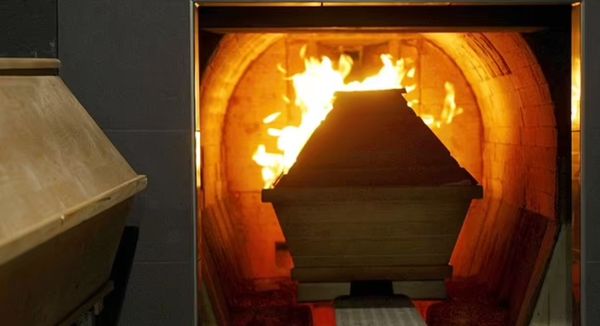In a remarkable turn of events, a woman who was believed to be deceased suddenly regained consciousness just moments before she was scheduled to be cremated. This extraordinary incident took place in Berhampur, India, involving 52-year-old Bujji Aamma, who had suffered severe burns in a house fire on February 1.

Aamma was rushed to MKCG Medical College and Hospital for urgent medical care, where she was treated for extensive burns covering half of her body. Despite her return home, her condition remained critical, partly due to the family’s financial constraints, which made it difficult to pursue further medical treatment. Sadly, on a fateful Monday, Aamma appeared unresponsive, leading her husband, Sibaram Palo, to make arrangements for her transport to the cremation ground.
Convinced that his wife had passed away, Palo arranged for a hearse to transport her to the funeral site. This somber journey towards her final rites took an unexpected turn when Aamma, defying all expectations, regained consciousness just as the funeral pyre was about to be completed. Aamma’s awakening astonished everyone present, including K Chiranjibi, who had accompanied her in the hearse. This extraordinary moment defied their expectations and challenged traditional beliefs.
The hearse driver, Khetrabashi Sahu, who had initially transported what was believed to be Aamma’s remains, quickly responded to this astonishing turn of events. He promptly facilitated Aamma’s return home, alive and breathing, in the very same vehicle that was meant to carry her lifeless body to the crematorium.
In the cultural context of India, last rites hold great significance and are deeply connected to a reverence for the natural world. Traditionally, the deceased are placed on a grass mat or on the ground, symbolizing a return to the embrace of the earth. Ceremonial rituals involving water, candles, and rice mark the spiritual transition.
In this particular case, Aamma’s family deviated from the customary practice of covering her eyes before taking her to the crematorium, unknowingly affording them the miraculous sight of her awakening. This departure from tradition ultimately led to an unexpected reunion with a loved one whom they had believed to be lost forever.
Interestingly, incidents of seemingly deceased individuals reviving are not isolated occurrences in India. Last October, in Silchar, a newborn baby was mistakenly declared stillborn, resulting in the issuance of a death certificate. However, the baby’s cries at the crematorium proved that this presumption was incorrect, offering a poignant reminder of the fragility of life and the resilience of the human spirit.
Although such occurrences are rare and extraordinary, they serve as powerful reminders of the unpredictable nature of existence. They challenge our conventional understanding of mortality and reaffirm our enduring hope for miraculous interventions in even the most seemingly insurmountable circumstances.






